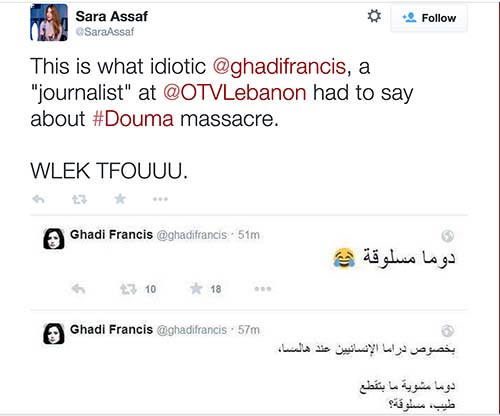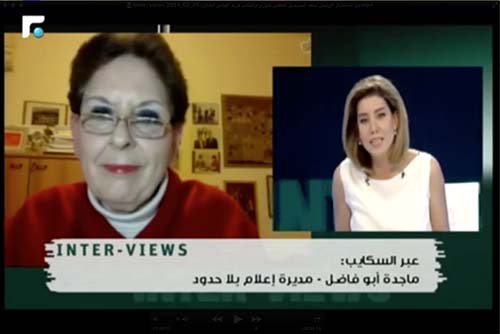Media Unlimited director Magda Abu-Fadil weighed in on a hot ethics topic following a Twitter slugfest during which a journalist and an activist carried on battling during a Lebanese TV talk show.
Journalist Ghadi Francis in a controversial tweet described the Syrian city of Douma as “meshwiyyeh” (Arabic for grilled or barbequed) by barrel bombs dropped on it that kill untold numbers of civilians.
When her label struck a raw nerve with opponents of the Syrian regime that’s accused of using these weapons, Francis then tweeted “if grilled doesn’t cut it, then it’s ‘maslouqa’ (boiled).”
That prompted activist Sara Assaf to lunge back: “This is what idiotic @ghadifrancis, a ‘journalist’ at @OTVLebanon had to say about #Douma massacre. WLEK TFOUUU (I spit on you).
Enter Paula Yacoubian, host of the political talk show “Inter-Views” on Lebanon’s Future TV, who, also in a tweet, invited both women to further expound on the matter on her program in February 2015.
Asked if there were guidelines to follow in social media under pressures of war and conflict, Abu-Fadil replied: “There are standards. While we have freedom to express ourselves through social media, it doesn’t mean we shouldn’t have a sense of responsibility.”
Abu-Fadil also referred to the five core values of journalism, expounded by Ethical Journalism Network director Aidan White in a video: as accuracy, independence, impartiality, humanity and accountability.
She argued that they apply equally to bloggers, activists and non-journalists using social media.
“What we’re seeing a lot on social media are reflexive answers, where someone tweets something and another person replies reflexively, with no consideration for critical thinking,” she said.
Abu-Fadil added that one has to stop and think about the repercussions of tweets and whether they could cause harm.
“What’s this incredible accomplishment of contributing to hate speech? It’s disgraceful. We’ve reached a level of unprecedented degeneration,” she noted.


